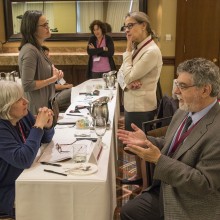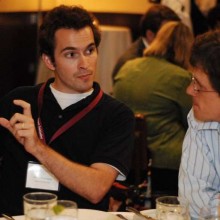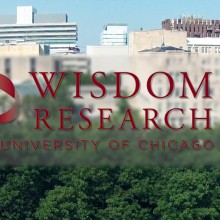About
Core Projects & Collaborations
Learn about the current core projects and other collaborations in Wisdom Research at the University of Chicago Center for Practical Wisdom.
Catch up on our past work on the Defining Wisdom Project (2007-2011) and the Wisdom Research Project (2012-2015).
Core Research Projects
The Chicago Wisdom Reseach Project demonstrated that listening to language about loving oneself and others increased compassion. Building on these findings, this project examines how the foundations of wisdom might be developed through narrative understanding. Pinker (2011) suggests that prosocial sensitivity and character development can be increased through narrative experiences that do not have to be lived. Further, when reading more than one story about similar problems understanding transfers to new problems. Dr. Howard C. Nusbaum, Founder of the University of Chicago Center for Practical Wisdom, is Lead Investigator of Narrative Experience and Individual Differences in Wisdom. He aims to understand if epistemic humility, reflection, and perseverance might be developed through narrative understanding.
This project invesitgates the relationship between wisdom and epistemic humility, and examines how epistemic humility can be measured. Dr. Berthold Hoeckner is Lead Investigator of Varieties of Epistemic Humility and Wisdom. In studying humility, he focuses on three important indicators or “hallmarks” of humility, which have also been associated with wisdom: (1) becoming open to new information; (2) having an undistorted sense of oneself; and (3) being aware and accepting of others.
This project investigates the role of epistemic humility in individual actions that involve practical wisdom and in interpersonal actions that require perspective taking. Problem solving through negotiation requires a deep understanding of the other’s goals and motivations, so realizing the limits of one’s knowledge could prompt one to more thoroughly seek more information, take perspective, and avoid the arrogant assumption that one knows enough. Dr. Boaz Keysar is Lead Investigator of Epistemic Humility, Perspective, and Wise Action. He evaluates individuals’ tendency to exhibit “practical wisdom” as described by Schwartz & Sharpe(2011). He aims to develop and validate several ways to manipulate epistemic humility.
Because language serves as a robust cure to social group membership, monitoring other's language usage may provide children with information about people's perspectives, social relationships, and communicative goals. Such early practice in flexible thought could facilitate both communication and creative thinking. Dr. Katherine Kinzler is Lead Investigator of Exposure to a Multilingual Environment Fuels Wise Development. Their previous research indicates that an exposure to a multilingual environment is related to effective non-verbal communication skills in 4-6-year-old children. Their study provided the first evidence that a multi-lingual environment may facilitate the development of perspective-taking tools that are critical for epistemic humility and effective social understanding in wisdom. Her current work evaluates the possibility that early multi-language exposure may confer unique skills but do not require speaking multiple languages.
Previous research has shown that interacting with nature environments can benefit memory, attention, and mood. Does exposure to nature increase measured wisdom, specifically in relation to changes in epistemic humility? Will interaction with nature also increase perseverance? Dr. Marc Berman is Lead Investigator of Effects of Nature on Increasing Perseverance & Reflection for Wisdom. He has composed novel neurophysiological indices of cognitive effort, allowing his team to examine if interactions with nature reduce effort on challenging cognitive tasks.
This project focuses on understanding the mechanisms by which some individuals flourish and persevere in the very circumstances that others find intolerable. Operating successfully in complex situations that involve risk and uncertainty, is central to the study of individual differences in stress responsivity, and to the study of wisdom. Dr. Greg Norman is Lead Investigator of Wisdom as a Moderator of Stress Resilience and Stress Contagion. With this project, he seeks to better understand the psychophysiological mechanisms associated with positive responses to stress, and to evaluate the potential moderational role that variables such epistemic humility, perseverance, and self-reflection play in individual differences in stress reactivity.
This project examines how the use of language to reflect on our experiences and thought processes affects decision-making and meta-cognition and contributes to wise reasoning. Although intuitively it would seem that careful consideration of our decisions, actions, and experiences can only improve them, recent research suggests this is not always the case. Dr. Anne Henly is the Lead Investigator of Reflection and Language in Wisdom - Making the Implicit Explicit. She aims to understand whether linguistically encoding our thoughts is beneficial or detrimental depends on the nature of a problem and the role of language in directing our attention. The work also focuses on the concept of habitualizing the process of articulation which may increase wisdom by making us more aware of the ambiguity and multifaceted nature of our thoughts and by increasing our metacognitive abilities.
This project investigates cost/time-effective interventions that can mitigate the endowment effect. Neoclassical economic theory underlies most quantitative evaluations of the “welfare” of individuals and societies. The theory posits that wise economic agents make decisions maximizing “utility” with respect to well-defined preferences. Accordingly, preferences are assumed to be independent of contextual factors. However, substantial research at the boundary of economics and psychology shows significant departures from “frame independent” preferences. For example, many experiments have demonstrated that people ask for a higher price when selling goods they own than they would pay to purchase the same goods, called the endowment effect. Dr. Ali Hortascu is Lead Investigator of Foundations of Economic Wisdom. He examines the relationship between changes in induced emotion regulation, reflection, and wisdom along with changes in endowment effect.
This project investigates human nature and potentials centered around moral transcendence. Yang's team explores our capacities to go beyond immediate self-interest by studying children and adults’ judgment and behaviors in situations involving moral conflicts between the self, others and groups at large. The lab also explores how self-transcendence enables optimal subjective experience that features happiness and meaning.
Center Accomplishments
Publications (2018-2019)
The Center has advanced scientific research with 29 journal articles, 26 research manuscripts in progress, and four book publications coauthored by wisdom network members. Read their publications here!
Presentations (2018-2019)
Find out about Center for Practical Wisdom presentations from 2018-2019 here!






